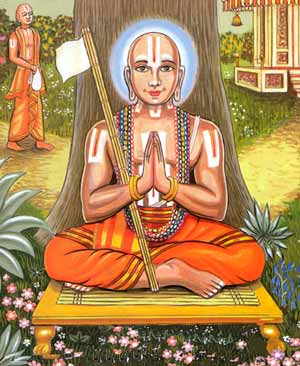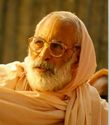

[Friday February 18th is the disappearance day of Sri Ramanujacarya, one of the four vaishnava sampradaya acaryas. To mark this auspicious day we are presenting the English translation of a Hindi lecture given by Srila Gurudeva on the appearance day of Sri Ramanujacarya in the year 2000.]
Today is the avirbhava, birthday, of Sri Ramanujacarya, and Rama-navami, the birthday of Rama, is coming very soon, Throughout Their entire lives, Rama and Sita always had problems, even though They are Bhagavan and His svarupa-shakti. They showed the example that in this world, even if you are a king, or even if you have are a very strong personality, you will still have to suffer. So try to be like Rama, Sita, and Hanuman. Don’t be worried. There are many histories of the lives of great personalities that illustrate this, such as the life history of Sri Ramanujacarya.
Ramanuja is an incarnation of Sri Laksmana (Lord Rama's younger brother), and he accepted the Sri Sampradaya. Srila Prabhupada Bhaktisiddhanta Sarasvati Thakura took many teachings from Sri Ramanujacarya, such as the duties of sannyasis, the duties of disciples, and Vaisnava etiquette. He utilized 108 teachings. We follow these, and we have also published them in our Bhagavata Patrika and Gaudiya Patrika (Hindi and Bengali Magazines).
Sri Ramanujacarya took birth in a simple family. His mother and father were not very wealthy, but they were of a high brahmana caste and they were very learned. Ramanujacarya was an outstanding boy from his childhood. While under the guidance of a Mayavadi guru named Yadavacarya, he was very careful in his studies. One day, when his guru was giving an impersonal explanation of a verse that contained the word taptyasana, he compared the lotus-eyes of the Lord to the hind part of a monkey which is reddish near his tail. Hearing this from his guru’s mouth, Ramanuja began to cry in great pain. He felt grief in his heart that his guru used such a bad analogy for describing the lotus-eyes of the Lord and, collecting himself, he very politely asked him if he could say something about the verse. Yadavacarya assented, and Ramanuja very nicely gave many explanations according to Sanskrit grammar. He said that the term taptyasana actually means he who brings water, and that is the sun. The lotus blossoms by the potency of the sun, and therefore the Lord’s eyes are compared to the lotus, not the monkey.
When Yadavacarya heard this, he thought, "This boy is dangerous. He is very expert and is giving such nice explanations. In the future he might uproot all the impersonal teachings from the Vedas, and so I must kill him." Fearing in this way, he announced to the boys that they would be going on an outing ona particular day, and he very confidentially told a few of his disciples of his plan to kill Ramanujacarya on that day. Within the group of these disciples, one boy was a cousin-brother of Ramanuja named Govinda. He discreetly came to Ramanujacarya and quietly informed him of their teacher’s intention. He said, "O brother, you should be very careful, for our teacher is planning to kill you tonight when we are all out together." Hearing this from Govinda, Ramanuja immediately left that place.
Throughout the day and night, he passed through dense forest, and it was difficult for him to discern his way, especially at night. Seeing His dear devotee in such a state, the Lord appeared in the form of Bharadvaja and, holding a conch in His hand, showed Ramanujacarya the way. Thus, within no time at all Ramanuja crossed the entire distance of the forest, and now he found himself standing outside a village. After some days, due to his compassion for Yadavacarya and with a desire to deliver him, he again began studying under his guidance.
After some years, Ramanuja converted Yadavacarya to Vaisnava philosophy, whereupon his teacher became his disciple. Some time thereafter, Ramanuja began hearing of the qualities of a great Vaisnava guru in South India by the name of Yamunacarya, and he eventually became Yamunacarya’s disciple. Later on he married, and his wife was very quarrelsome. Her behavior was discourteous and uncooperative, and incidents would often take place, which he would have to somehow tolerate.
A disciple of Sri Yamunacarya and elder god-brother of Sri Ramanuja named Kancipurna came to Ramanujacarya's village along with his wife. Ramanujacarya accepted Kancipurna as a siksa-guru. One day, when Kanchipurna’s wife was taking some water from a well, she met Ramanujacarya’s wife, who had also come to the well for drawing water. It so happened that while taking the water from the well, some water from the pot of Kanchipurna’s wife spilled into the pot of Ramanujacarya’s wife. Although this was a small accident, Ramanujacarya'swife became furious and insulted Kanchipurna’s wife with abusive language. Kanchipurna became hurt when he later on heard about this and, without informing Ramanujacarya, he and his wife left that place and went to Sri Rangam.
Later on, when Sri Ramanujacarya came to know that his wife’s behavior had offended a Vaisnava, he felt very bad and thought, "She is committing Vaisnava aparadha; she has such an offensive mentality. I must do something about it."
One day, a hungry brahmana came to Ramanujacarya, asking for some food. Ramanuja sent this brahmana to his wife, telling him, "Go to my home and tell my wife that I sent you. She will give you some food." When that brahmana came to Ramanujacarya’s wife, she boldly insulted him again and again. She told him he should get out of there, and that there was no food for him.
Returning to Ramanujacarya, the brahmana reported what had happened, and Ramanujacarya replied, "Wait here for a few minutes." He left and wrote a letter to his wife, as though it was written by her father, stating, "O my dear daughter, I am arranging the marriage of my son, your brother. So please come, and please bring your husband with you." Writing these words, he very carefully folded that letter and tied it with colorful threads. And, along with that, he sent a coconut and other auspicious items.
He then gave that letter to the brahmana and said, “Now go again to my wife. She will welcome you nicely this time”. The brahmana went again and, after reading the letter, Ramanuja’s wife’s behavior completely changed. This time she welcomed him warmly and sweetly, and offered him all kinds of palatable food and sweets.
When Sri Ramanujacarya came home, his wife told him about the marriage and, citing her father’s request for both of them to come, requested him to please come along. Ramanujacarya said, "No, I cannot come; I am very busy. You may go now with this brahmana. Don't be late."
After his wife left with that brahmana, Ramanujacarya locked the door of his house and went to Sri Rangam to meet his Gurudeva, Sri Yamunacarya. He wanted to take sannyasa from him, but when he reached Sri Rangam, he found that Sri Yamunacarya had just passed away and his disciples were walking in a funeral procession with his divine body. Ramanujacarya felt very disheartened and sad. He asked them to stop for a moment. He wanted them to uncover the transcendental body so that he could take darsana of his Gurudeva’s divine form. He observed that all the fingers on one of his Gurudeva’s hands were open, and on the other, three fingers were closed. He inquired from the disciples all around as to the reason, and he wanted to know when it had happened.
No one could answer. They said, "We didn’t notice it before; it must have happened just now." Ramanujacarya became silent, and after some time he spoke, addressing Sri Yamunacarya’s transcendental body. He said, "I will first of all write a Vaisnava commentary on Vedanta, and I will preach that Vaisnava commentary throughout India." One finger opened, and Ramanuja spoke further, "I will take tridandi-sannyasa right now, and I will preach the message of Vaisnava dharma and your teachings." When Yamunacarya heard that, his second finger opened. Ramanuja then said, "I will systematically write about Vaisnava etiquette, explaining the behavior required to execute pure devotional service, and what precautions should be taken. I will also preach this throughout India." After uttering this third statement, Ramanuja observed, along with all present, that three of Yamunacarya’s fingers had now opened. Then and there, Ramanujacarya formally accepted tridandi sannyasa from Yamunacarya.
What is the duty of an ideal disciple’ He should not merely stay with Gurudeva; he should try to give his energy, by body, mind and words, and try to serve him according to his desires. He should not just be present physically, thinking something exciting is going to happen, while remaining unenthusiastic to serve. That is not a disciple, but rather something quite opposite. A true disciple always desires, with heart and mind, to better serve Gurudeva.
Ramanujacarya had now formally taken initiation from Yamunacarya. Afterwards, all the disciples of Yamunacarya, who were great scholars and who had served their Gurudeva for so many years, came together. Having seen the extraordinary characteristics and personality of Ramanuja, they collectively decided that he should be appointed as the next acarya after their Gurudeva, and they honored him with that acarya seat in Sri Rangam. Ramanujacarya accepted the orders of his god-brothers, but before sitting and acting as the acarya, he went to each of his god-brothers, for two months, four months, six months, or one year, and served each of them. He thus formally endeavored to further understand the teachings of Yamunacarya because he had not gotten the opportunity to spend much time with him. After serving and satisfying them, Sri Ramanuja commenced his role as acarya of the Sri Sampradaya in Sri Rangam.
We should carefully follow Ramanujacarya’s example. Not only should we intimately serve our Gurudeva, we should also respect and properly honor our god-brothers and god-sisters. If someone is senior to us, having served our Gurudeva longer, we should show that person great honor. If someone is equal to us, we should give friendly honor to him, and if we encounter someone in an inferior position and who is serious about learning, we should always be merciful. We should try to perform devotional service in a very harmonious way.
When Sri Ramanujacarya officially became the acarya, he began preaching the cult of Yamunacarya very strongly. In South India, two impersonalist sects are very prominent: Saiva and Sankaracarya. Sankaracarya’s followers subscribe to Vedanta-sutras like 'sarvam kalvidam brahma' and 'tat tvam asi.' They think themselves brahma (the impersonal God), and they think everything comes from brahma. The Saiva school considers Lord Siva to be the ultimate truth,and they want to merge into him. This is the basic difference between the two, and Ramanujacarya refuted and defeated all impersonalism by his very strong and effective preaching.
Transcriber and editor: Kanaka-manjari dasi
Assistant editor: Syamarani dasi
HTML: Bhutabhavana dasa
![[BVML Home Page]](../grfx/bml_logo.gif)
